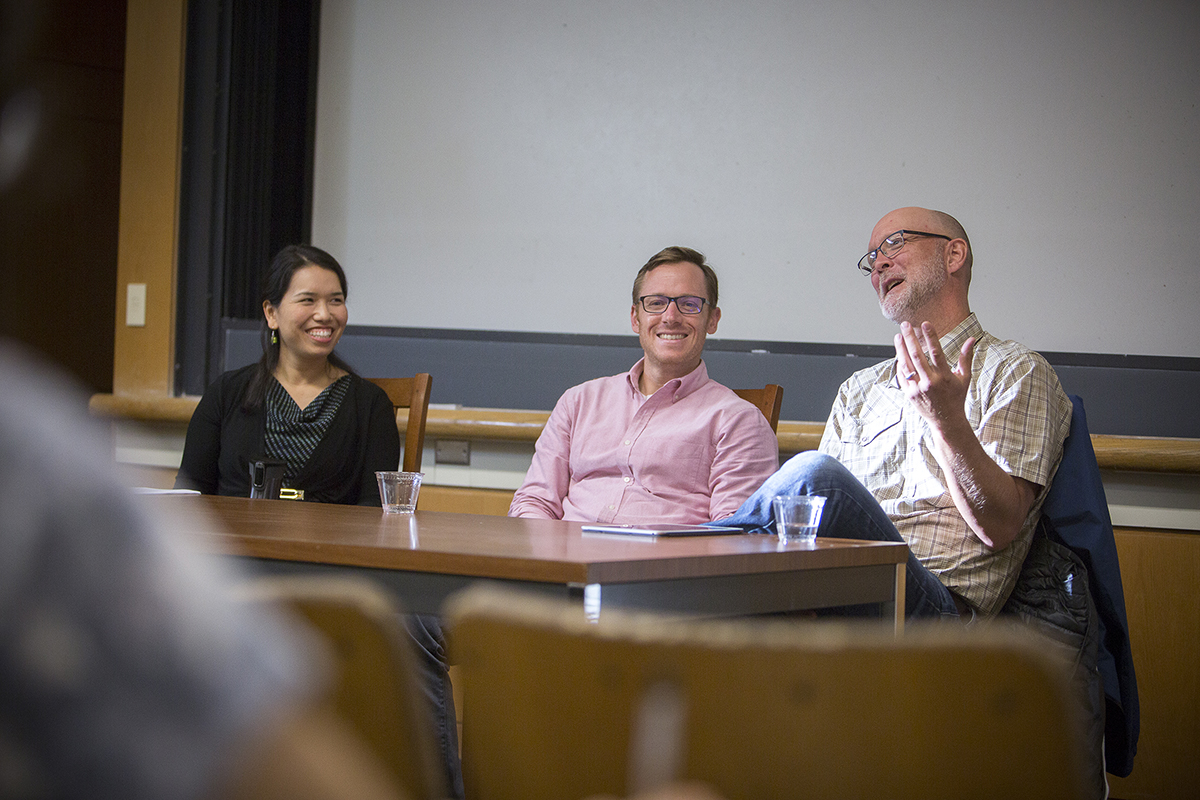Roundtable examines Asia's place in U.S. presidential election
By Linda B. Glaser

China has been lobbed back and forth between the presidential candidates in this election cycle like a political football. But despite appearances, China is not necessarily central to the game this election season, said Allen Carlson at the China-Asia Pacific Studies (CAPS) Program roundtable Oct. 19 in Kaufmann Auditorium.
Instead, China has been in play “according to the extent to which the two candidates see that it suits their domestic interests and plays to their constituents,” said Carlson, CAPS director and professor of government.
Also participating in the “Asia in the U.S. Presidential Election: A Political Football?” roundtable were associate professors of government Jessica Weiss, a China expert, and Thomas Pepinsky, an expert on Southeast Asia. They addressed the question of where the American relationship with Asia is headed, and what impact this election season will have on that future.
Carlson drew stark contrasts between the candidates’ attitudes toward China. “When [Hillary] Clinton has mentioned China, it’s been in the context of continuity with the Obama administration. On the other side, [Donald] Trump has no approach to China that is at all coherent. He uses China to play to his base regarding their economic fears,” he said.
This lack of real discussion of China by the candidates is worrisome, said Carlson, because questions are piling up: “TPP [Trans Pacific Partnership Agreement], but also regarding security and how do we and China’s neighbors deal with China as it’s entering a new stage of muscularity in foreign policy and economics. We have no idea of where U.S. policy toward Asia is headed, based on this campaign.”
Pepinsky agreed, noting that this is a domestic policies election. “Foreign policy is only brought in as ammunition for domestic arguments. This is unfortunate, because the next administration will face a particularly complicated set of challenges related to Thailand, Korea, Japan and the Philippines. The new president will need a nimble and strong foreign policy team to deal with this,” he said.
U.S. relations with Indonesia under Obama benefited from a certain warmth because of Obama’s youth, said Pepinsky, an advantage the new president won’t have. “Our relations with Indonesia are important but not often talked about,” he said. “But security cooperation, such as [on] terrorism, human trafficking and refugee policy, all require knowledgeable and sensitive foreign policy to see the overlap of U.S. and Indonesian interests.”
Weiss discussed research she’d been doing with a former student that found the Chinese government pays close attention to campaign rhetoric in countries such as Taiwan and Japan as well as the U.S. “They see it is as one of many indications of whether there will be change or continuity in that government’s policy toward China,” she said. In Taiwan, candidates tend to move toward the middle, while U.S. candidates tend to talk tough. When candidates are inconsistent, she said, China takes a wait-and-see stance during a campaign, then looks carefully at what happens afterward.
But in this election, she said, Clinton’s campaign has been largely consistent with her long foreign policy record, which enables China to take her rhetoric seriously as an indication of what will happen. In contrast, she said Trump as president is seen as bringing a great deal of volatility; for example, would he allow South Korea to gain nuclear weapons? “Those in China who value stability prefer Clinton because even if they don’t prefer her policies, they think there’s less risk, from a Chinese perspective,” said Weiss.
And while Clinton has established a long history of advocating for human rights, such as her landmark 1995 speech, “it remains to be seen what emphasis the Clinton administration will put on human rights,” said Weiss. “In her first visit to Beijing she said that human rights shouldn’t hold up other initiatives. She’s an idealist as well as realist, so how will that play out?”
In contrast, Weiss noted that Trump called the Tiananmen Square protests of 1989 a “riot,” seemingly approving of the Chinese government’s use of deadly force to deal with it.
Linda B. Glaser is a staff writer for the College of Arts and Sciences.
Media Contact
Get Cornell news delivered right to your inbox.
Subscribe